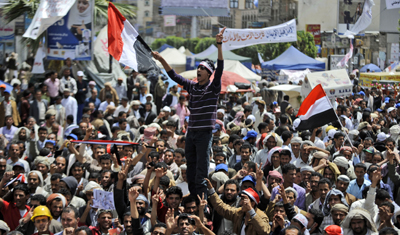New York, March 14, 2011–Authorities in Yemen and Bahrain are continuing to obstruct news coverage of ongoing political unrest, the Committee to Protect Journalists said today as it called on the two government to allow journalists to work without reprisal. In Yemen, at least six international journalists were expelled since Saturday, according to news reports and CPJ interviews. In Bahrain, security forces and plainclothes men attacked an Al-Wasat photojournalist covering a demonstration in the capital, Manama.
Yemeni security forces today raided a Sana’a apartment shared by four international journalists, The New York Times reported. The Times identified the journalists as Oliver Holmes, a contributor to The Wall Street Journal and Time magazine; Haley Sweetland Edwards, a contributor to the Los Angeles Times; Joshua Maricish, a photographer; and Portia Walker, a contributor to The Washington Post. The four were brought before immigration authorities who ordered their expulsion for “national security reasons.” The Times identified Holmes and Walker as British, Maricish and Edwards as American.
“I’m positive that this is related to the fact that all four of us have been reporting about the upswing of violence against protesters,” Holmes told the Times by phone from the airport. Edwards said their expulsion was a clear indication that the crackdown against protesters will intensify “and there’s no one here who’s going to see it.”
Reporter Patrick Symmes and photographer Marco Di Lauro, on assignment for Outside, a U.S.-based travel and adventure magazine, were detained Saturday by security agents, Symmes told CPJ. Although they had press visas, they were put on a flight to Istanbul. “It is obvious that we are being expelled simply to prevent the chance that we are in any way capable of learning what is happening in Sana’a,” Symmes told CPJ in an e-mail. Symmes said they were working on a travel article and had repeatedly emphasized to authorities that “we have not asked to cover demonstrations, and have not done so.”
Government supporters continue to intimidate local reporters. On Saturday, a group of about 20 people believed to be government supporters went to the Journalists Syndicate in Sana’a and threatened to burn it down, according to two local journalists and an item posted on the syndicate’s website.
“We are alarmed by the expulsion of foreign journalists and fear that it may be the prelude to intensified repression of local journalists seeking to cover the protests in Yemen,” said CPJ Deputy Director Robert Mahoney. “We call on the authorities to revoke these expulsions and allow all journalists to work freely.”
In Bahrain, security forces and men in plain clothes beat Mohammed al-Mukharaq, a photographer working for the independent daily Al-Wasat, according to news reports and local journalists. Mukharaq, wearing a vest that carried the name of his newspaper, told CPJ he was covering a demonstration on Sunday in Manama when a group of 20 or more men approached, beat him, crushed his camera and mobile phone. Mukharaq said he suffered extensive bruising.
Local journalists told CPJ that a list called the “Bahrain list of dishonor,” is circulating online and identifying 25 people as “collaborators aiming to sell their country.” The author is unclear. CPJ, which reviewed the list, found the names of at least nine critical journalists, including Mansour al-Jamri, editor-in-chief of Al-Wasat; Abduljalil Alsingace, a Bahraini blogger and human rights activist; Ali Abdel Imam, a Bahraini blogger; and Qasem Hussein, a critical columnist. One journalist whose name appears on the list told CPJ: “I don’t feel safe anymore. I’m receiving threats via phone telling me that they will stab me in the back and my name is also on the list.” The journalist asked not to be identified for fear of reprisal.
“Reports of the existence of a ‘Bahrain list of dishonor’ are deeply troubling,” CPJ’s Mahoney said. “The authorities must condemn this list and ensure the safety of all journalists.”
